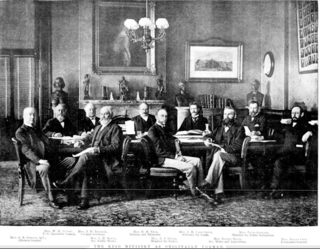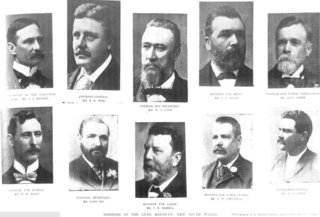Related Research Articles

Sydney Smith was an Australian politician. He began his parliamentary career in the New South Wales Legislative Assembly and served as a government minister under Henry Parkes. He transferred to the new House of Representatives after Federation, representing the Division of Macquarie from 1901 to 1906. He served as Postmaster-General in the Reid Government from 1904 to 1905.
University of Sydney was an electoral district of the Legislative Assembly in the Australian state of New South Wales from 1876 to 1880. It was established in the 1858 redistribution to be elected by graduates of the University of Sydney once there were 100 eligible electors.
Hastings was an electoral district of the Legislative Assembly in the Australian state of New South Wales from 1859 to 1880. It was abolished in 1880 as part of the first major redistribution since 1858, replaced by Hastings and Manning from 1880 to 1894, which elected two members with voters casting two votes and the two leading candidates being elected. In 1894 it was divided between the single-member electoral district of Hastings and Macleay and Manning. In 1920 proportional representation was introduced and Hastings and Macleay was absorbed into the new four-member district of Oxley. The electorate was named after the Hastings, the alluvial valleys of which contained most of its population.
Hastings and Macleay was an electoral district of the Legislative Assembly in the Australian state of New South Wales from 1894 to 1920. It was created with the division of the two-member electorate of Hastings and Manning. In 1920 proportional representation was introduced and Hastings and Macleay was absorbed into the new four-member district of Oxley. The electorate was named after the Hastings and Macleay Rivers, the alluvial valleys of which contained most of its population.

Francis Clarke was an Australian politician.

James Henry Young was an Australian colonial businessman and politician and Speaker of the New South Wales Legislative Assembly.

The third Dibbs ministry, the 27th ministry of the Colony of New South Wales, was led by Sir George Dibbs, leader of the Protectionist Party, following the 1891 New South Wales election, which saw the Labour Party win seats in the New South Wales Legislative Assembly and the balance of power. With no party having a majority, Sir Henry Parkes held on as Premier until October 1891 when he lost a vote in the Legislative Assembly, causing Parkes to resign as Premier and leader of the Free Trade Party. Dibbs formed the ministry on 23 October 1891, with Labour support, and comprised 10 ministers.

The Reid ministry was the 28th ministry of the Colony of New South Wales, and was led by the 12th Premier, George Reid. The title of Premier was widely used to refer to the Leader of Government, but was not a formal position in the government until 1920. Instead the Premier was appointed to another portfolio, usually Colonial Secretary but on this occasion Reid took the portfolio of Colonial Treasurer until July 1899 and then Attorney General.

The Lyne ministry was the 29th ministry of the Colony of New South Wales, and was led by the 13th Premier, Sir William Lyne, KCMG.
Otho Orde Dangar was an Australian politician.
The 1901 New South Wales state election was for 125 electoral districts, with each district returning one member. The election was conducted on the basis of a simple majority or first-past-the-post voting system. In this election, in 32 electorates the winning candidate received less than 50% of the votes, while 13 were uncontested. The average number of enrolled voters per electorate was 2,764, ranging from Wentworth (1,706) to Willoughby (4,854).
East Sydney, an electoral district of the Legislative Assembly in the Australian state of New South Wales was created in 1859 and abolished in 1894.
A by-election was held for the New South Wales Legislative Assembly electorate of East Sydney on 7 November 1891 because Edmund Barton (Protectionist) was appointed Attorney General in the third Dibbs ministry. Such ministerial by-elections were usually uncontested and the other seven other ministers, George Dibbs, Henry Copeland, John Kidd (Camden), William Lyne, John See (Grafton), Thomas Slattery (Boorowa) and Francis Suttor (Bathurst), were re-elected unopposed.
The Hastings and Manning, an electoral district of the Legislative Assembly in the Australian state of New South Wales was created in 1880 and abolished in 1894.
The Hastings and The Macleay, an electoral district of the Legislative Assembly in the Australian state of New South Wales was created in 1894 and abolished in 1920.
A by-election was held for the New South Wales Legislative Assembly electorate of Hastings and Macleay on 23 September 1898 because Francis Clarke resigned to allow Edmund Barton to re-enter parliament.
The Macleay, an electoral district of the Legislative Assembly in the Australian state of New South Wales, was created in 1880 and abolished in 1894.
University of Sydney, an electoral district of the Legislative Assembly in the Australian state of New South Wales, was created in 1876 and abolished in 1880.
A by-election was held for the New South Wales Legislative Assembly electorate of University of Sydney on 15 July 1879 because William Windeyer resigned to accept a temporary appointment as a judge of the Supreme Court.
Wellington, an electoral district of the Legislative Assembly in the Australian state of New South Wales, was created in 1859 and abolished in 1904.
References
- ↑ Rutledge, Martha. "Barton, Sir Edmund (Toby) (1849–1920)". Australian Dictionary of Biography . Melbourne University Press. ISSN 1833-7538 . Retrieved 10 June 2020– via National Centre of Biography, Australian National University.
- ↑ Green, Antony. "1898 Hastings and Macleay by-election". New South Wales Election Results 1856-2007. Parliament of New South Wales . Retrieved 25 September 2020.
- ↑ "Sir Edmund Barton GCMG (1849–1920)". Former Members of the Parliament of New South Wales . Retrieved 16 April 2019.
- ↑ "Writ of election: Hastings and Macleay". New South Wales Government Gazette (137). 14 February 1900. p. 1289. Retrieved 25 September 2020– via Trove.
- ↑ Green, Antony. "1900 Hastings and Macleay by-election". New South Wales Election Results 1856-2007. Parliament of New South Wales . Retrieved 25 September 2020.